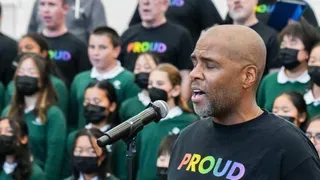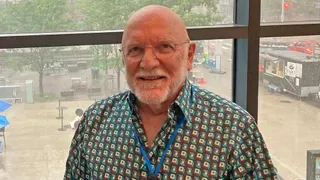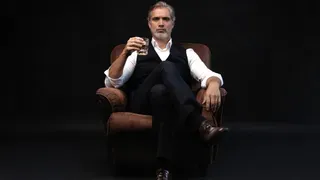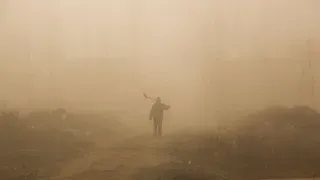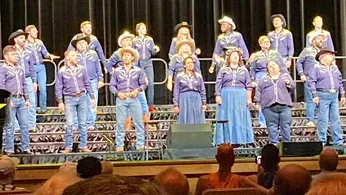
July 18, 2024
Blogging GALA: Part Three
Kilian Melloy READ TIME: 6 MIN.
GALA, the great gathering of LGBTQ+ choruses from around the country and around the world, is over for another four years. The 2024 edition featured 7,000 participants, 134 events (many musical, many not), 307 performers (individuals as well as choruses), and five sleep-deprived days of community and joy.
This correspondent volunteered 12 hours behind the scenes to get a fuller view of the experience, and while I couldn't see the dancing the choruses put on from backstage, I could certainly hear and appreciate the music.
There were four major venues for the performances: The Minneapolis Convention center with its large auditorium and enormous ballroom space; the sprawling facility known as Orchestra Hall; and Central Lutheran Church, a lovely space of worship that gave the performances that unfolded there a sacramental sense. Other spaces also served, including the outdoor area known as Peavey Plaza... when, that is, afternoon thunderstorms didn't chase everyone inside.
After lumping all my volunteer hours into two days, I was free to spend the final days enjoying nothing but music all day every day. The experience became a sonic blur punctuated with bright costuming and spectacular dance numbers, political defiance, and shared expressions of communal hope for the future and grief for the hard-won progress that's now being steadily, maliciously stripped away.
It didn't help that a lone wolf attempted to assassinate former president and national Divider in Chief Donald Trump over the same weekend as the festival was taking place. No one talked about the event directly, but it reverberated in the air and brought a new depth to the sense that we were "singing for our lives," to borrow a quote from the festival's closing speeches. (It's now speculated that the would-be assassin might have had a plan to take out both Trump and Biden - the twisted result, perhaps, of our brutally polarized political environment.)
But if we were, and still are, singing for our lives, our best defense and most invulnerable armor is queer joy. Pride Chorus Houston brought an A-game that featured line- and square dancing-inspired choreography, snap-button shirts and cowboy hats, and queer-infused country music. (Their rendition of Miranda Lambert's "Y'all Means Y'all" might be the single most thrilling moment in the entire festival.) Helsinki's Friends of Dorothy were basically a European version of The Village People. A group called The Rainbows narrated an overview of America's homophobic history, recalling that when the group started Pride parade participants sometimes wore paper bags over their heads because "You could walk in the Pride parade Sunday afternoon, be recognized on the news Sunday evening, and be fired Monday morning." Sine Nome brought a smile to everyone's face with what they called "an English madrigal version of 'Wannabe'." Qwery Queer – a small ensemble of female singers from Ukraine – poured out their anguish and their pride, national and otherwise, in a set of folk songs before addressing the audience in English: "I wish you all the best and I hope you never know what it means to be living in a state of war." And the Appalachian Equality Chorus put on a performance of "The Village" that felt directly addressed to the headlines.
The Seattle Men's Chorus captured the spectrum and range of the festival with fewer than half a dozen songs, which included a couple of sober numbers (one addressing the issue of immigration) but also a bookended pair of rousing dance numbers – a medley of "Survivor" and "I Will Survive" and a selection from "Kinky Boots," "The Sex is in the Heel."
The Boston Gay Men's Chorus was not in attendance this time around (though various former members attended with their new choruses and various active BGMC members came on their own). Being a former member myself (at least until we return to Boston), I sought out my fellow BGMCers, and that included Seattle Men's Chorus Executive Director Craig Coogan, who did an exemplary job as the executive director of the BGMC until Seattle lured him away.
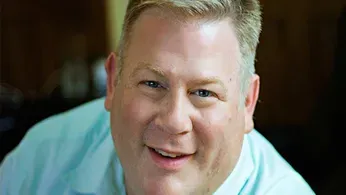
Source: Michael Willer
My path crossed with Craig's several times, and there never seemed to be an opportune moment to interview him for this series of blogs. All the same, we exchanged messages for this article, and Craig gave his thoughts about several topics relevant to the LGBTQ+ choral movement and the political and social climate of the times.
EDGE: This is the first GALA since the pandemic. How has the situation for the LGBTQ+ choral movement changed?
Craig Coogan: Coming out of the COVID shutdowns has been hard on all performing arts groups, including choruses. We're no different. We're all adapting to shrinking audiences [and] reduced public and private funding while balancing ever-increasing costs. That said... LGBTQ+ Choruses are more vital than ever. Our lives are dependent on who's in power and what the judiciary decides on a given day. We must tell our stories through song so that we're no longer negotiating for our right to exist, but to celebrate who we are and what we contribute to the world.
EDGE: This is also the first GALA since you took on leadership of the Seattle Men's Chorus and its sister chorus, the Seattle Women's Chorus. What are the challenges and opportunities of being the executive director of a men's chorus as well as a women's chorus, and how are they different from what you were doing with the BGMC?
Craig Coogan: It's an honor to take on legacy choruses SMC and SWC. The LGBTQ+ choral movement was built on the work of those who have gone before us, and SMC has been a leader for nearly 45 years, SWC for 21. Each of our Seattle Choruses have experiences to tell through [music], whether it is LGBTQ+ or from the female perspective. Each of our choruses has a unique identity, membership, and audience. Continuing to tell our stories through song is the challenge and opportunity we have!
EDGE: One of your signature accomplishments while with the BGMC was the brokering of the arrangement that made it possible for BGMC Principal Accompanist and Assistant Music Director Chad Weirick to put together a show made up of songs from Disney movies. That show is now being performed across the country – including by the SMC. What big ambitions do you have for the SMC and SWC?
Craig Coogan: Telling the LGBTQ+ experience through the Disney songbook was an extraordinary experience for each of the dozen choruses who performed Chad's seminal work. We continue to do that in Seattle.
This year SWC commissioned five living female identified composers to take on a banned book and write a song about that. We wove those pieces together with other banned music through powerful and innovative storytelling.
Drag artists are being criminalized – and SMC took that on building a new show with "RuPaul" royalty Nina West – that we called "You Can't Stop the Drag." The show used pop songs, humor and video to take on the social issue.
These examples from this season are a realization of the ambitions for SMC and SWC to continue to make music that makes a difference.
As is traditional for GALA, the location of the next festival was announced during the closing event. 2028 will see LGBTQ+ choruses returning to Minneapolis once again!
Kilian Melloy serves as EDGE Media Network's Associate Arts Editor and Staff Contributor. His professional memberships include the National Lesbian & Gay Journalists Association, the Boston Online Film Critics Association, The Gay and Lesbian Entertainment Critics Association, and the Boston Theater Critics Association's Elliot Norton Awards Committee.

